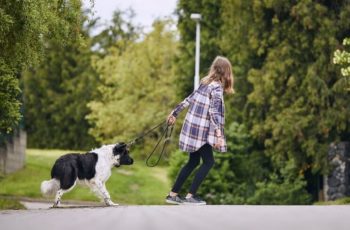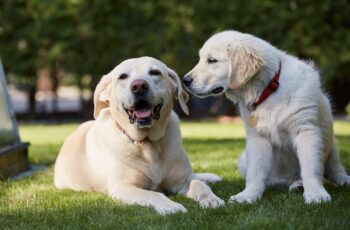We all love puppies, right? They’re so cute and fun! Unfortunately, when puppies get excited, they tend to bite.
Puppies tend to explore the world with their mouth, so naturally, they bite when they’re overly excited.
The good news is that most puppies naturally grow out of this constant biting phase! Since puppies naturally explore the world with their mouth, it’s essential to start training from a young age, so your puppy understands biting isn’t allowed.
In this article, I’ll teach you how to prevent your puppy from biting you when they’re excited. While you might feel hopeless and like you have a little land shark at home, one of these ways is bound to help save your arms and legs!
Why Does My Dog Bite Me When Excited?
To prevent your dog from biting you when they’re excited, we have to understand what causes them to bite you in the first place.
When dogs become excited, they tend to get amped up or over-aroused, and every dog reacts differently to feeling over-aroused. Some dogs will bark or jump, but many dogs will bite.
Puppies need some way to channel this energy, which often ends up being through the use of their mouth.
How Much Play Biting is Normal?
Naturally, puppies will bite when they play because they’re used to exploring the world with their mouth. Even though biting during play is completely normal behavior, it doesn’t make it any less annoying for you!
Just like humans, puppies go through teething phases. Teething is painful for puppies so they will bite more during these phases.
Puppies begin teething around 3 weeks old. By 6 weeks old, all of their puppy teeth should have come in.
Around 12 weeks old, they begin to lose those puppy teeth. By 6 months of age, all of their puppy teeth should be gone, and they should now have a mouth full of adult teeth!
When their mouth is less painful around 6 months old, the biting should naturally start to decrease. If your puppy is still extra bitey, you’ll want to focus on teaching your puppy not to bite with the steps I’ve outlined in this article.
Even though play biting is entirely normal, you should seek help from a professional trainer if your puppy is.
- Biting, barking, and growling when you go near toys
- Stiffening and staring before biting
- Biting, barking, and jumping when not playing
How To Stop a Puppy From Biting When Over-Excited
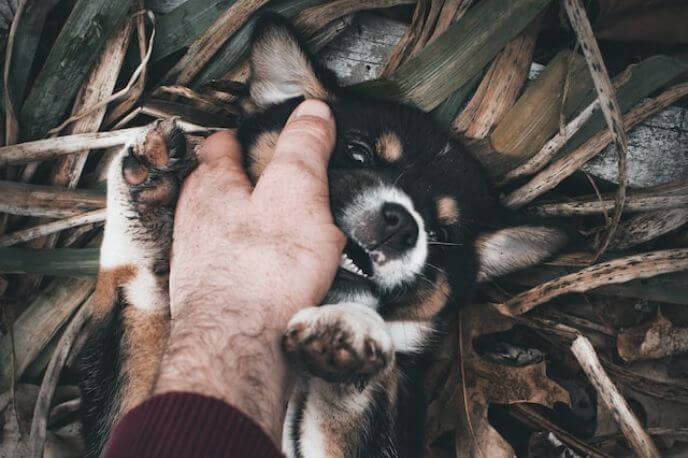
Puppies thrive on routine and consistency. If the same training rules aren’t applied in all scenarios with all members of the household, it will be difficult for your puppy to learn.
If multiple members in the household will be interacting with the puppy, it’s helpful to establish clear training rules and boundaries. Your puppy will learn much quicker if you’re all on the same page about how to respond when your puppy does bite.
Remove Yourself From the Situation
When your puppy bites you, immediately remove yourself from the situation by walking away.
It’s essential to do this calmly and quietly. Dogs thrive on attention, so even looking at them or talking to them (even if you’re telling them “no”) could inadvertently reward the bad biting behavior.
If your puppy is still overly excited and biting at you, you may need to separate yourself by going into another room and closing the door.
Punishing and yelling at your puppy isn’t a wise decision. While puppy bites are painful with their sharp teeth, your puppy is just doing what comes naturally since they haven’t been taught otherwise (yet).
A fundamental principle in dog training is consistency, so it’s crucial that all members practice this same method anytime the puppy bites them during interactions. If they don’t follow the same rules, the puppy won’t learn the concept we want them to – that biting makes the fun end, and people leave.
Prevent Your Puppy From Getting Over-Excited
When training a puppy, as much as possible, it’s vital to prevent bad behaviors from happening in the first place.
Puppies most commonly get over-excited and bite the most during playtime. One easy way to prevent them from getting over-excited in the first place is to end the play session early.
By ending the play session early, your puppy won’t have the opportunity to get over-aroused, so he naturally won’t be inclined to bite. You know your puppy best and can probably tell when he’s just about to get a little too wild, so a good rule of thumb is to stop playing right then.
Teach Your Puppy an Off Switch
Puppies are persistent, and their energy will keep escalating the longer they engage in playtime. You can teach them to have an off switch during playtime.
The concept of an off switch is to teach your puppy to control his energy levels and to change from high to low energy levels quickly. Not only is this a helpful skill to prevent your puppy from biting, but this is also a life skill that will benefit your dog by teaching him to relax.
To teach your puppy how to have an off switch:
- Start by setting aside a 10-minute chunk of time to dedicate to this training activity.
- Grab your puppy’s favorite toy that he goes crazy for and begin playing.
- After 2-3 minutes of letting your puppy have the toy, remove or hide the toy and ask your puppy to sit or lay down.
- Be sure to generously reward your puppy for calmly sitting or laying down by giving them a food reward.
- Have your puppy maintain this calm sitting or laying down behavior for 1-2 minutes. Be sure to reward your puppy generously every 15-30 seconds.
- Once the 1-2 minutes is up, re-introduce the toy and begin playing with your puppy.
- Repeat steps 3-6 until your timer is up!
Not only is this a fun training activity, but this will help your puppy learn to adjust to abrupt changes from lots of activity to no activity.
Provide Enough Chew Toys
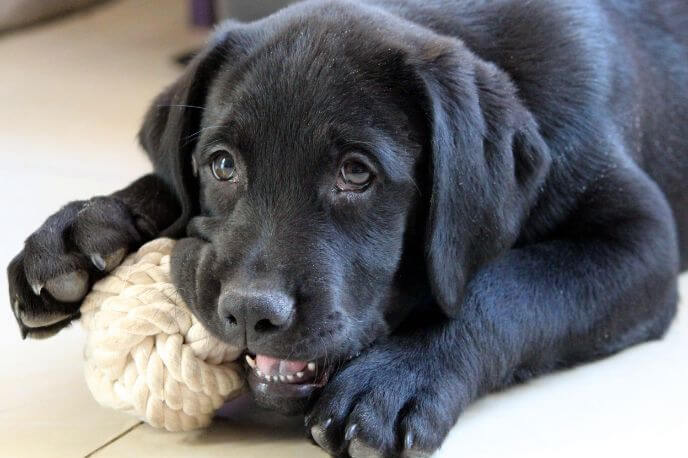
Puppies need to be able to fulfill their need to bite and chew safely. It’s an instinct for puppies to be able to bite and chew on things, and chewing can relieve some of the pain associated with teething.
Be sure to provide plenty of chew toys so your puppy can satisfy this need. When your puppy is extra bitey, that may indicate their mouth is painful, so you can try to re-direct their attention off of biting your hands and onto biting an appropriate chew toy.
Always supervise your puppy with a new chew, but here are safe options to consider:
Common Mistakes to Avoid
If you research, you’ll find many different training techniques to stop your puppy from biting. I’ll list some methods and explain why I don’t recommend them.
High-pitched squealing
The concept behind this technique is that it startles your dog and teaches them they’re playing too rough.
The problem: More often than not, this excites dogs. This level of excitement and the fact that you sound like a squeaky toy makes them bite harder.
Yelling “no” over and over
In dog training, it’s important to give dogs directions by telling them what you want them to do instead of waiting for them to perform a behavior you don’t like, only for you to yell at them.
The problem: Let’s be honest – it sucks to have to yell at your dog. It’s much easier (and nicer for everyone) if you set your dog up for success by not allowing them to perform the bad behavior in the first place. Plus, some dogs perceive any attention directed their way as good attention, which could inadvertently reward the biting behavior.
Holding your puppy’s muzzle closed
The idea here is that, of course, your puppy cannot bite if its mouth is closed.
The problem: Unfortunately, this isn’t teaching your puppy anything. In addition, it may cause your puppy to become nervous anytime you put your hands near its mouth.
Alpha rolling
Compulsion-based dog trainers will tell you to assert dominance by pinning your dog to the ground.
The problem: This outdated technique does nothing other than teach your dog to be afraid of you.
How to Stop a Puppy From Biting When Putting on a Harness
Harnesses are a popular option for your puppy when taking them for a walk.
They remove any excessive pressure from the neck, and they’re more secure for puppies who may be prone to escaping by backing out of a collar.
At first, harnesses are weird to puppies. They’re used to not wearing anything, so it’s understandable they become bitey when you try to put the harness on.
Go Slow and Create a Positive Emotional Response
We want to teach puppies to be excited and happy when the harness comes out.
To teach your puppy how to stop biting when putting on a harness:
- Show your puppy the harness, and then reward your puppy. You can even place the harness on the floor and reward your puppy for investigating it.
- With a treat in your hand, lure your puppy into the harness. If their head needs to go through the harness, hold the harness with one hand and use your other hand to lure their head through it. If it’s a step-in harness, place the harness on the floor and lure your puppy into placing its legs in the holes.
- Placing treats on the ground will encourage your puppy to stand to eat them, which will help get the harness on their body to buckle it.
- Once your puppy becomes comfortable, you’ll be able to harness them quickly and reward them once they’re buckled in.
How to Stop a Puppy from Biting Ankles When Walking
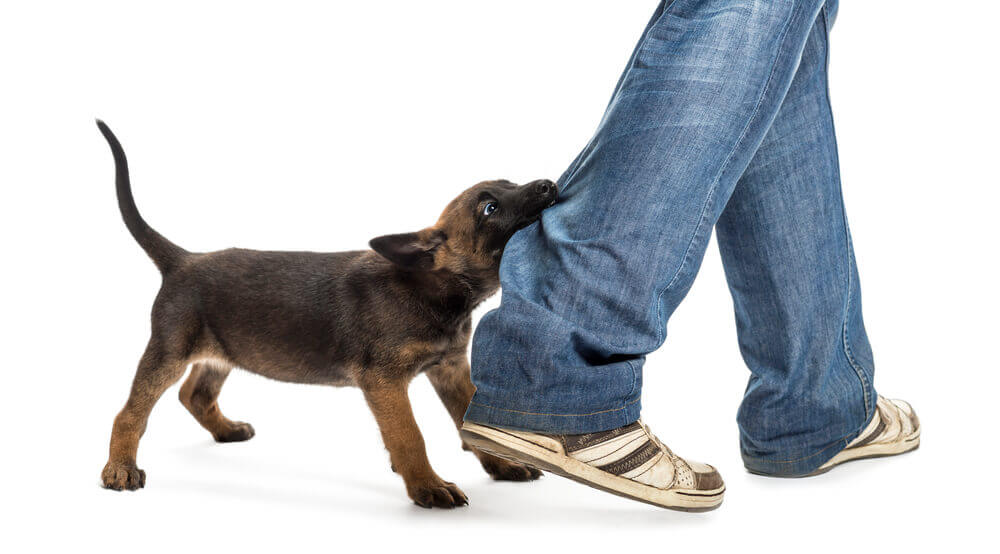
It’s no coincidence that people often jokingly refer to puppies as “ankle biters.” Herding breeds are especially prone to biting ankles, so it’s essential to work on training right away.
While this may appear silly for a small puppy, you want to take this ankle-biting behavior seriously. For puppies, biting ankles is a self-rewarding behavior, so the more often they do it means they’re more likely to continue doing it as they get bigger.
Teach Your Puppy to Walk Nicely
The concept here is to teach your puppy to walk next to you nicely without biting your ankles.
To teach your puppy to walk nicely:
- Place some treats on the ground and allow your puppy to eat them.
- Once they’re finished eating, slowly start taking 1-2 steps away.
- As your puppy is running up to you, lower your hand to reward them before they have the chance to bite your ankles.
- Once your puppy begins to understand this concept, slowly add in the number of steps you take while your puppy is right behind you. Be sure to reward for the good behavior of not biting ankles.
Unfortunately for your arms and legs, biting is a normal part of puppy development. Since this is a natural behavior, it’s essential to start training early and be consistent with training so that your puppy understands biting isn’t acceptable behavior.
Puppies may be extra bitey during their painful teething phase, which ends around 6 months of age. If your puppy is still biting you and causing pain or is biting you outside of playtime, you should consider seeking help from a professional trainer.
Since puppies go through teething phases until about 6 months of age, it’s crucial to ensure they have plenty of chew toys. Chew toys will help direct their chewing and biting to more appropriate items instead of your arms and legs!
In most cases, puppies will naturally stop biting so much as they mature and are no longer teething. Training puppies not to bite can take time, but your efforts will be worth it when you have a dog that no longer goes after your arms and legs.

